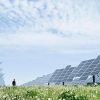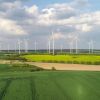The future is green
Sustainability is at a premium in South Africa. The country aims to promote “green” energy sources with German help

The news that Germans are energy savers and pioneers in the development of renewable energy has now reached South Africa. In February 2013, Elizabeth Dipuo Peters, the Minister of Energy of South Africa at that time, and Stefan Kapferer, State Secretary at the Federal Ministry for Economic Affairs and Energy (BMWi), signed a declaration of intent on an energy partnership. A corresponding working group includes participation not only from the BMWi, but also the German Society for International Cooperation (GIZ), KfW Bankengruppe and the Southern African-German Chamber of Commerce and Industry.
What sounds like a lot of paperwork is intended by both countries to give life and reality to the conversion of the energy landscape. What is this about? First of all, it is about the expansion of renewable energies, but also about the expansion of the power grid, research and increased energy efficiency. Conditions for the development of renewable energy sources are particularly favourable in South Africa, said Kapferer, referring to the country’s abundance of sunshine and wind. Germany will deliver the corresponding technology. Together, both countries also want to make advances in reducing CO2 emissions through carbon capture and storage in underground facilities.
South Africa is not often mentioned in connection with renewable energy: it is one of the world’s 15 largest producers of greenhouse gases and obtains most of its energy from coal. Some 95% of this power is delivered by the Eskom Group, a state enterprise. However, energy demand is increasing in South Africa and coal is becoming scarcer. Although two enormous coal-fired power plants are currently under construction, the search for alternatives to this type of energy supply is becoming more urgent. Interest in renewable energy in South Africa comes primarily from the steadily growing black middle class. In recent years, especially in urban areas, a strong environmental movement has formed, for which the concepts “organic” and “sustainable” play a major role. The desire for alternative forms of energy comes mainly form the young and middle generations.
On the German side, this partnership is beneficial because South Africa is one of Germany’s most important trading partners in sub-Saharan Africa. The volume of trade amounts to approximately 13.9 billion euros annually. Accordingly, there is a strong desire on the part of German industry to intensify trade relations and create private business opportunities. A partnership already exists between the two countries in the energy sector, although not at the level of alternative energy sources: Germany imports 70% of its coal from abroad and 20% of this total comes from South Africa.
One reason for South Africa’s desire for an energy partnership that will enable the country to benefit from German experience and expertise is probably its sometimes erratic power supply. Mismanagement, corruption and failed investments have led in recent years to nationwide blackouts. Businesses were no longer able to function and entire industries paralyzed. As a result, electricity prices have tripled, a development that not only hurts the economy but also particularly affects the poor. ▪
Andrea Jeska

